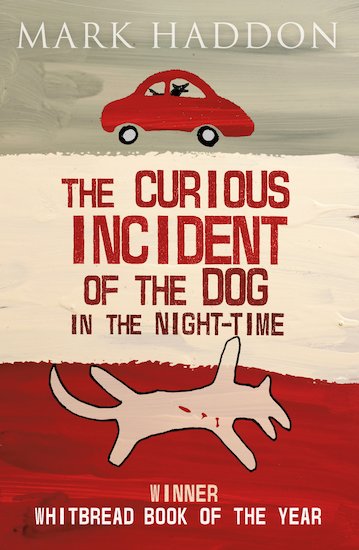The Curious Incident of the Dog in the Night-time (Mark Haddon)

At first glance I was convinced the
book to be one of the detective stories, which would cover a case related to a
dog as the cover implies. But unexpectedly, and as many other readers would
also be, my assumption was wrong.
It did not take long to realize that
the main protagonist, Christopher Boone is autistic. The first few chapters,
which is marked as the ‘2’ and not ‘1’ due to his preference for prime numbers,
already indicates that he has a hard time contemplating feelings and thoughts
of others. On the other hand Christopher displays a particular fondness and
talent for mathematics and physics, and this characteristic is permeated even
to his daily lives as he exacts exactness and punctuality in everything; time,
arrangement of furniture, and logical reasoning to an extreme degree. So
overall, it can be said that he follows the general conception of ‘autism
children,’ which as considered eccentric and emotionless. Thus I believed in
the beginning that Christopher would somehow harness his logic to solve the
crime and people would be surprised in the end. But I was wrong – and I
realized that in the middle when his dad confesses that he killed Wellington,
the dog, out of rage and confusedness. The story was about the growth of a
little autism kid rather than deduction and reasoning.
Nevertheless, I enjoyed the book quite
a lot. For starters, I am a big fan of Sherlock Holmes so I noticed that this
book would have a connection to it as the title is taken from a remark of
Sherlock Holmes himself. And as expected, the famous series is mentioned
continuously throughout the story as Christopher’s favorite book. But moreover,
Mark Haddon’s narrative on Christopher’s stream of consciousness was
fascinating; I was often amazed at how every trivial detail showed his personal
trait, such as explaining his age with days and months. His dialogue is also
constructed to feel distinct from others as it exudes more rigidness and
indifference. It was because of these specific descriptions I could construct
an image of Christopher more clearly.
But
because I did so vividly, I became increasingly sympathetic with his father
rather than him himself. It was understandable that Christopher was shocked
after realizing the truth but abandoning his dad instantly and running off would
have been such a cruel treatment in the perspective of his dad. It is almost a
miracle he did not go insane and run off like his mother did. His dad is always
sacrificing, sacrificing, and sacrificing. But Christopher – yes, I know he has
autism – never gives a damn. Even in the end, when all seems optimistic it is
actually his dad who pays all the price; he gets expelled out of his house and
is forced to embrace his wife. After I was finished and closed the book, all
that lingered was a strange awkwardness and pity for the dad.
Overall, ‘the curious incident of
the dog in the night-time’ portrays the life of an autism child in an
interesting way and how he grows within society. I might as well read other
books of Mark Haddon later on.
[ Quotes ]
“Prime
numbers are what is left when you have taken all the patterns away. I think
prime numbers are like life. They are very logical but you could never work out
the rules, even if you spent all your time thinking about them.”
“Sometimes
we get sad about things and we don’t like to tell other people that we are sad
about them. We like to keep it a secret. Or sometimes, we are sad but we really
don’t know why we are sad, so we say we aren’t sad but we really are.”
“Lots
of things are mysteries. But that doesn’t mean there isn’t an answer to them.
It’s just that scientists haven’t found the answer yet.”

댓글
댓글 쓰기